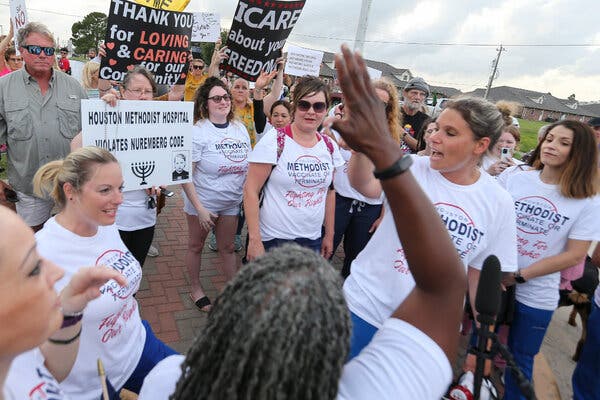Dozens of staff members at a Houston-area hospital protested on Monday night against a policy that requires employees to be vaccinated against Covid-19.
The hospital, Houston Methodist, had told employees that they had to be vaccinated by Monday. Last month, 117 employees filed a lawsuit against the hospital over the vaccine policy.
While the U.S. Centers for Disease Control and Prevention recommends health care workers get a flu shot, and some hospital systems require it, few American companies have required Covid-19 shots, despite federal government guidance that says employers can mandate vaccines for onsite workers.
Executives, lawyers and consultants say that many companies remain hesitant because of a long list of legal considerations the Equal Employment Opportunity Commission says must be followed before mandating vaccinations. Some companies say they are wary of setting mandates until the vaccines have received full approval by the Food and Drug Administration, which has so far granted emergency use authorization.
Jennifer Bridges, a nurse who led the Houston Methodist protest, has cited the lack of full F.D.A. approval for the shots as a reason she won’t get vaccinated.
Vaccine hesitancy has been high among frontline health care workers in the United States: Surveys showed that nearly half remained unvaccinated as of mid-March, despite being among the first to become eligible for the shots in December. A March 2021 survey by the Kaiser Family Foundation found that health care workers had concerns about the vaccines’ newness and their possible side effects, both of which are common reasons for waiting to be vaccinated.
By Monday evening, dozens of Houston Methodist employees had gathered outside the hospital system’s location in Baytown, Texas, holding signs that read “Vaxx is Venom” and “Don’t Lose Sight Of Our Rights.”
“If we don’t stop this now and do some kind of change, everybody’s just going to topple,” Ms. Bridges told local news media covering the protest. “It’s going to create a domino effect. Everybody across the nation is going to be forced to get things into their body that they don’t want and that’s not right.”
Those who did not meet the hospital’s vaccination deadline on Monday will be placed on a two-week unpaid suspension. If they do not meet the requirements by June 21, Houston Methodist said it would “initiate the employee termination process.”
The workers’ lawsuit accuses the hospital of “forcing its employees to be human ‘guinea pigs’ as a condition for continued employment.”
In a statement, Houston Methodist said that by Monday, nearly 100 percent of its 26,000 employees had complied with the vaccine policy. The hospital said it was aware that some employees who had not met the vaccine requirements planned to protest, and had invited other employees to join them.
“We fully support the right of our employees to peacefully gather on their own time, but it is unacceptable to even suggest they abandon their patients to participate in this activity,” the hospital said. “We have faith that our employees will continue putting our patients first.”
On Monday, Gov. Greg Abbott of Texas signed a law prohibiting businesses or government entities in the state from requiring vaccine passports, or digital proof of vaccination, joining states such as Florida and Arkansas. It’s unclear how or if the new law will affect employer mandates like Houston Methodist’s.
In some industries, including aviation, employers are taking a middle-ground approach. Delta Air Lines, which is distributing vaccines out of its flight museum in Atlanta, said in May that it would strongly encourage employees to get vaccinated and require it for new hires.
United Airlines, after considering a blanket mandate, said last week that it would require anyone hired in the United States after June 15 to provide proof of vaccination no later than a week after starting. Exceptions may be made for those who have medical or religious reasons for not getting vaccinated, the company added.
Global Roundup

The Philippine government said it would expand its Covid-19 vaccination drive this week by opening up shots to millions more essential workers, as officials sought to step up a sluggish effort and lift the economy.
With more doses arriving from China, Russia and the Covax vaccine-sharing initiative, officials said that the Philippines in the coming months would inoculate more than 35 million people who work outside the home, including medical staff, public transport employees, journalists and others. But so far, the government has only a fraction of the doses it needs to do that.
Carlito Galvez Jr., the leader of the government’s coronavirus strategy team, said at a news conference on Monday night that vaccinating these workers was necessary to “drive the economy.”
Because they must work outside the home, these workers “are among the most vulnerable to the disease and must be protected, regardless of the industry they belong to,” Mr. Galvez said.
About six million people have received at least one vaccine dose in the Philippines, where until now only frontline workers, older people and those with certain medical conditions have been eligible for shots. Many Filipinos have expressed doubts about the safety of the vaccines. Experts say that it could take many more months to inoculate enough of the country’s 108 million people to reach herd immunity, if it occurs at all.
The government said that the Philippines has received approximately 9.3 million vaccine doses, and that some shipments had been delayed. Most of the doses are from Chinese drugmaker Sinovac; others in use include the Sputnik V vaccine from Russia and the AstraZeneca and Pfizer shots supplied by Covax.
Mr. Galvez said that more doses were expected to arrive in the coming months, including 15 million more Pfizer doses in the third quarter of the year.
New coronavirus infections in the Philippines have declined from a peak in March and April, but the disease continues to race through the country, especially in outlying provinces. Health officials on Monday reported 71 deaths from the virus, bringing the total death toll to nearly 22,000. The country has recorded more than 1.2 million infections, among the highest totals in Asia.
President Rodrigo Duterte warned that anyone who flouted health protocols could be charged with a criminal offense, noting during a weekly cabinet meeting on Monday that he has seen many people not wearing masks in public. Mr. Duterte, who is known for blustery talk, said that someone who was infected with the coronavirus but did not wear a mask “could be charged with murder.”
“If not,” he added,” you could also be charged with reckless imprudence.”
In other developments around the globe:
-
Spain reopened its borders on Monday to Americans and other vaccinated visitors from countries that the authorities consider to have a low risk Covid-19, seeking to shore up the summer tourism that is a pillar of its economy. Visitors from countries that Spain lists as presenting a higher risk, like France and Germany, must now produce only a negative antigen test, rather than the more costly PCR test previously required. Cruise ships will also be able to dock again at Spanish ports.
Raphael Minder contributed reporting.

As part of its strategy to vaccinate more of its population, Washington State will allow adults to claim a free marijuana joint when they receive a Covid-19 vaccination shot.
The state’s liquor and cannabis board announced on Monday that the promotion, called “Joints for Jabs,” was effective immediately and would run through July 12.
The board said it would allow participating marijuana retailers to provide customers who are 21 or older with a prerolled joint when they received their first or second dose at an active vaccine clinic at the retail location. The promotion applies only to joints, not to other products like edibles.
So far in Washington, 58 percent of people have received at least one dose, and 49 percent are fully vaccinated, according to a New York Times database.
Washington is not the only state to offer a cannabis promotion. An Arizona dispensary recently announced a similar campaign, providing free marijuana joints or gummy edibles to Arizonans 21 and older who receive a vaccination.
Washington’s liquor and cannabis board recently allowed for a free beer, wine or cocktail to residents with proof of vaccination.
Since the U.S. pace of vaccinations began to decline sharply in mid-April, states and cities have started promotions like free beer in New Jersey and a raffle to win full-ride college scholarships in New York and Ohio. Several states have held lotteries awarding cash prizes of $1 million or more.
Andy Slavitt, a White House virus adviser, has said the Biden administration was encouraging states to be creative — including through lotteries or other financial incentives — to get people vaccinated. The federal government is allowing states to use certain federal relief funds to pay for those types of programs.



















